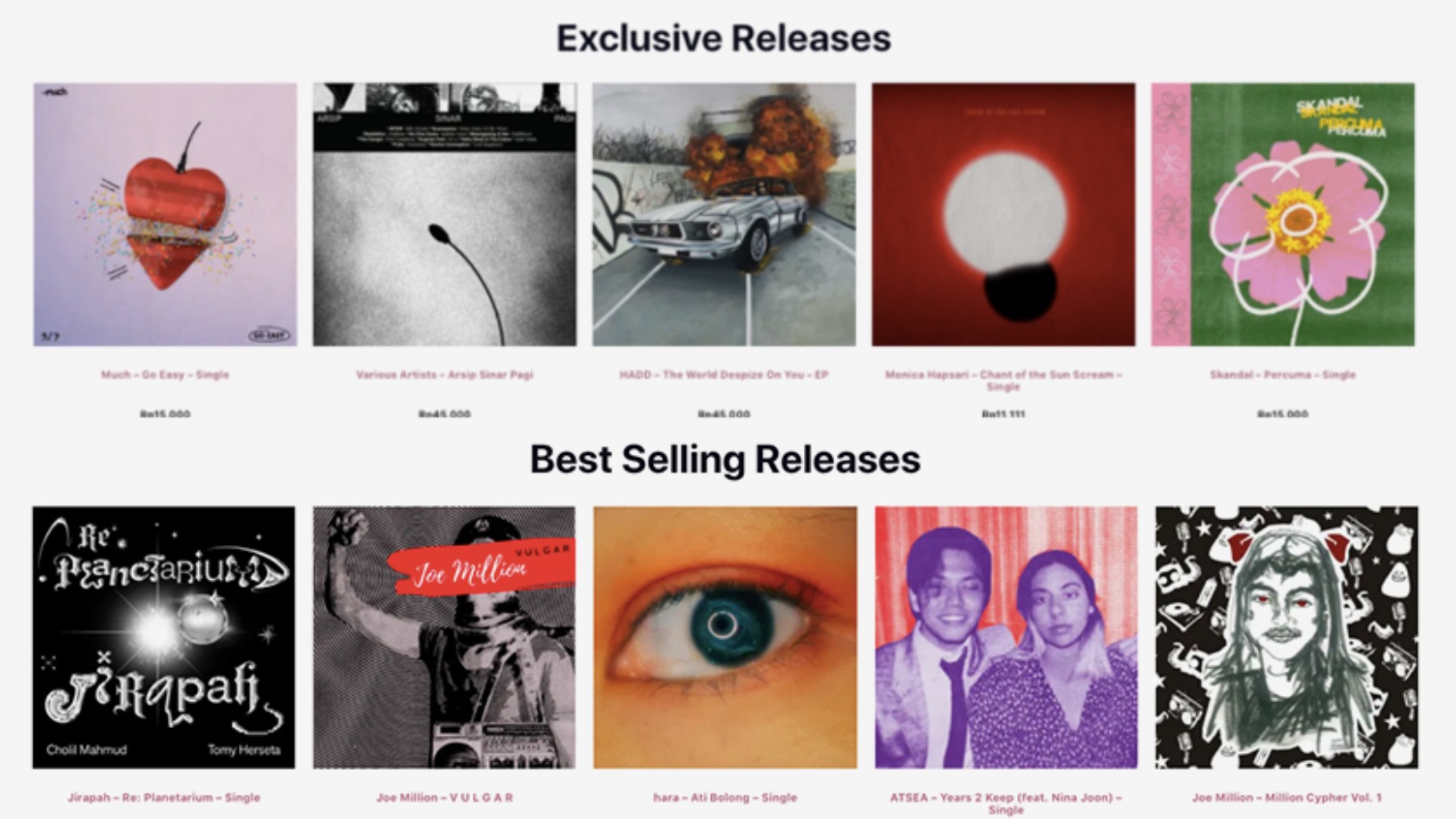Established in September 2020 by key players in the Indonesian independent music scene, The Store Front, the first online music store of its kind in Indonesia, is a reaction to musicians’ loss of income during the pandemic as well as the low royalty rates paid by streaming services.
Spotify, the current dominant streaming service, pays artists on average $0.0038 per stream, does not reveal production credits of songs and has been criticized for practices considered akin to “payola.” The Store Front, on the other hand, pays artists 90% of digital sales and 80–85% of physical sales.
“We have been advocating for a more transparent industry for as long as we can remember,“ said Store Director and founder Argia Adhidhanendra at an online interview with CompassList.
The Store Front, which aims to set an example by paying a decent amount of money to bands, both international and local, publishes a monthly financial disclosure on its website called “Transparency,” which shows the company’s total monthly sales and how much was paid to musicians.
The monthly report for the period November 21 to December 25, 2020 shows that the startup paid artists almost IDR 8.9m of the IDR 9.84m it earned. “We aim to let listeners see how their money is going to support their favorite musicians,” Adhidhanendra said.
Equitable platform
Adhidhanendra knows the music industry well. In January 2014, he co-founded the concert production company noisewhore, which has successfully produced shows in Indonesia, featuring musicians from the independent scene abroad, including US bands American Football and Unknown Mortal Orchestra.
“The music industry still suffers from distrust between artists and corporate sponsors, labels and distributors, and justifiably so,” Adhidhanendra said. “I’ve heard countless bands not getting their due. Even we suffered our share of exploitation. So we wanted to set high standards in the industry.”
Unlike streaming services, The Store Front’s customers pay to download high-resolution audio albums, along with digital cover sleeves, liner notes and other related art that comes with the album. They are then free to play those files on any device. The artists are sent royalties on the 25th of every month, along with a detailed breakdown of their sales.

Adhidhanendra conceived the idea of an “equitable” platform when he heard first-hand accounts from musician friends who were struggling from loss of income due to the cancellation of concerts, which were also a source of income from sales of merchandise like t-shirts and physical albums.
These musicians also relied heavily on the streaming of their songs but it quickly became apparent that to make anything resembling a reasonable income was impossible during the pandemic. The US-based Union of Musicians' “Justice at Spotify” campaign estimates it would take 786 streams “to generate enough revenue to buy an average cup of coffee.”
“We try to empower musicians as best as we can by giving a chance to their fans to directly give support to them for their body of work,” said Technical Director Joewono, who was present at the interview.
Willing to pay
SInce its launch, The Store Front has recorded decent sales through just word-of-mouth promotion. A large part of this is because of noisewhore's positive reputation among music fans.
“In two months, we sold over 500 digital copies and distributed more than IDR 10m to artists. This, of course, is breadcrumbs to some people but it goes a long way in this industry,” Adhidhanendra said. In November 2020, the platform started selling merchandise, which is expected to add to the revenue that the store generates for artists.
Like Bandcamp, a similar US platform, which managed to bring in $40m in sales during the pandemic and is known for hosting a large number of underground artists with only 15% in cuts, The Store Front hopes to wring in a culture where paying a fair amount for music becomes the norm again.
So far, The Store Front is self-financed and the plan is to keep it that way to avoid any corporate interest that conflicts with the goal of supporting artists. The team has used its personal savings and support from their public tip jar. It hasn't been easy, but product manager Aliyya Asra, who was also at the interview, said it has been “spiritually fulfilling.”
“It wasn’t the easiest thing to find the middle ground between minimizing expenses to prevent us from burning out – financially especially – while still sticking true to our principles, specifically our 90% initiative for every artist,” she said.
According to Adhidhanendra, The Store Front has shown that people are still willing to pay for music, as long as you give something extra. “This means extra songs, digital liner notes and more.” The platform's best sellers so far have been releases made by artists exclusively for the website.
“Some people, especially those who were born in the 2000s, only know one option to listen to music, and that is streaming [but] I’m pretty optimistic. I think people would [pay] if they know that streaming isn’t sustainable for the artists.”











